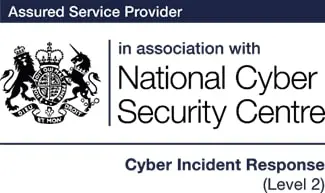Learn more about what a managed SOC is, how it will protect your business 24/7 from cyberattacks and why DigitalXRAID’s managed SOC service might be right for you.
Protect your business 24/7 with Managed SOC Services
The cost of data breaches is high. If not detected immediately, mitigating the damage from a successful attack can take months.
Businesses without in-house cyber security expertise may struggle to know how to mitigate risks effectively. Putting more focus on detection and response, finding and resolving breaches before they become serious incidents, takes specialist skill sets.
The smartest decision is to outsource your Security Operations Centre to the experts.
Get started
What are Managed SOC Service Providers?
A SOC is made up of a team of security analysts who monitor security incidents and analyse a company’s networks, cloud environments, systems and data logs day and night. It has a vast array of tooling which detects, analyses and responds to cyber threats 24/7 in real-time.
A SOC should be an essential part of a company’s cybersecurity strategy. However, building an expert team to monitor threats 24/7/365 is not easy with skills and funds in short supply. That’s why many companies are handing this responsibility over to a managed SOC service.
The service – sometimes also referred to as SOC-as-a-Service or SOCaaS – is essentially the same as a fully-fledged in-house SOC function but is operated by an outsourced provider who monitors all networks, systems and applications on behalf of its customers.
A managed SOC service provider will take care of security monitoring, vulnerability and malware detection, managed detection and response, threat monitoring, incident response, security audits, and much more.
Managed Cybersecurity Services: What does a managed SOC service monitor?
Typically, a managed SOC service monitors all sources of network traffic and activities to detect suspicious activity or anomalies. The services provider will gather all event logs and activity from cloud or network infrastructure, devices, applications, databases, and more, across its client’s organisation.
The collected data is then analysed by the managed SOC analysts, through tooling and threat intelligence platforms. At any and all times of the day or night, threats detected and identified for remediation are responded to before they can cause any disruption to business operations, or damage to reputation.

For a fully-managed SOC service to best fulfil its purpose, it requires a constant influx of data. This can also include all the information that flows through the network and databases in the form of:
Network and DNS logs
Firewall and intrusion detection/prevention logs
Email and web logs
Database activity logs
Event logs
And more
The Benefits of a Managed SOC
The risk of a security breach has never been higher for businesses across the globe. Governments are seeing an 1885% increase in ransomware attacks. It’s extremely difficult for businesses with little or no cyber security expertise to be prepared to deal with breaches. The service can provide the level of technical knowledge and infrastructure needed to address these challenges and improve security posture.
Here are some of the benefits it can offer.
There are many advantages to outsourcing 24/7 cyber security to a managed SOC service provider. A Security Operations Centre can cost upwards of £500,000 to set up. Aside from that, a SOC will need a minimum of 10 employees to work on 24-hour shift patterns. There are specialised skills needed to manage security operations, and it takes time to acquire and develop these skills.
With thousands of alerts being delivered to the SOC every day, how can an IT team take on this additional work? A SOC without enough time or resources becomes vulnerable. The divided attention to security could potentially result in a security risk, as well as a delay in fixing vulnerabilities.
To match the capability of a managed SOC service, an in-house SOC would also need to invest in all the tools, systems and software needed. This is why many organisations choose a managed SOC service at a fraction of the cost.
SOC managed services improve security by providing the necessary resources and expertise 24/7/365, allowing the organisation to avoid spending large sums on hiring and maintaining security staff and tools.
Outsourcing to a managed SOC service provider frees internal IT staff to pursue important operation and digital transformation tasks while safe in the knowledge that their security is being monitored. Most importantly, an organisation can achieve world-class threat detection and response without high upfront costs or the stress of hiring, training and retaining talented analysts.
The cyber security industry as a whole is short of 2.7 million workers, and SOC analysts are arguably among the hardest to come by. This is coupled with stress and burnout associated with alert overload. This usually comes down to cheap tooling spitting out false positives with no way to prioritise signals.
This leads on to another challenge: the cost of technology investments. Organisations must find the right blend of tools to provide the insight their analysts need. That’s not always easy in a crowded market where vendor hype is sometimes difficult to penetrate.
SIEMs can be useful but often require constant tuning to be effective, which many in-house SOC teams don’t have the time or resource for. The financial burden on organisations that choose to do SecOps in-house is growing.
According to one study, perceived ROI is dropping in over half of organisations due to management complexity. The same report claims security engineering costs are creeping towards $3m annually, but only 51% rate these efforts as effective.
It is not always possible for smaller organisations to tackle the digital skills gap by investing in a larger security analysts team or a wider technology stack. As a result, the best way to support in-house teams during this mass exodus of cyber talent is to outsource to security experts.
Security partners bring industry-wide insight and extensive knowledge of the entire threatscape and it therefore makes sense for organisations to invest in this aggregate value. This is especially pertinent for smaller organisations that simply do not have the resource in house for constant threat monitoring of suspicious activity, and considering the continued growth of the cyber skills gap.
Discuss your cyber security options
Get in touch today to speak to an expert and secure your business, or call us on 0800 090 3734
Choosing the right Managed SOC provider
The truth is that not all managed SOC service offerings are created equal. Finding the right partner is a higher stakes game than many realise. Get it wrong and cyber risk and costs could quickly spiral out of control.
For a guide on how to choose the right managed SOC service provider for your business, read our blog, or read the latest ebook.

DigitalXRAID’s CREST Accredited Managed SOC Services
DigitalXRAID’s CREST accredited managed SOC operates 24/7/365, with a dedicated team of analysts monitoring customers’ networks, systems and applications, keeping them secure and responding to security events in real time.
The flagship service helps customers understand and reduce risk. Our security services operate as an extension of your own IT and security team, working seamlessly to provide world-class threat detection and response to identify and neutralise an attack in less than 6 minutes.
The service uniquely provides the complete spectrum of advanced threat detection and response capabilities, more recently coined as XDR (Extended Detection and Response).
The service includes vulnerability management, IDS & IPS, threat mining, SOAR, SIEM & log management, endpoint D&R, file integrity monitoring, dark web monitoring and full compliance reporting.
Partnering with us makes cybersecurity a priority without overspending. It can also free up time for business leaders to focus on building their enterprises. We will take care of security monitoring, vulnerability and malware detection, managed detection and response services, threat monitoring, incident response, security audits, and much more.
What’s special about our managed SOC service?
- The managed SOC service provides state of the art tooling and expertise, for less than the cost of one InfoSec employee. This supports increased new business through supply chain assurance. Risk reduction and advanced cyber protection is accessible for SMEs and provides larger enterprises with additional resources, without expanding in-house operations or straining existing teams
- DigitalXRAID’s SOC service is completely impartial, not looking to sell any particular security software or solutions. We are only interested in your business needs
- We operate 24/7/365 with some of the highest qualified security professionals in the world, holding CCIE Security and CISSP certifications, amongst others. The SOC is one of the first in the world to hold CREST certification and continues to be in the top 1% globally with this certification
- Unlike other providers, DigitalXRAID has achieved government-grade security accreditations on top of the elite CREST certification, with ISO 9001 for Quality Management Systems, ISO 20000 for IT Service Management and Cyber Essentials data security certifications added for complete peace of mind for customers
Threat Intelligence
The Hive: Threat Intelligence
DigitalXRAID’s Threat Intelligence draws from the most comprehensive picture of the current state of cybersecurity.
DigitalXRAID’s SOC analysts and CTI specialists are fed data from the entire internet, every day, to map out adversaries and their infrastructure. This gives the SOC team greater visibility into the hidden sites where cybercriminals instigate their attacks and enhances proactive threat protection.
Enquire about SOC

Flexible Pricing Options
No hidden costs. Transparent future pricing
To provide flexibility for our customers, our pricing structure is offered across three solution types: Essentials, Core, and Proactive SOC.
These offerings allow customers to choose the correct solution that meets their specific needs and budget, rather than being forced into a one-size-fits-all solution.
Enquire about SOCBespoke Customer Service
Big Enough to Deliver, Small Enough to Care
We understand that no two customers are the same. Your reputation is DigitalXRAID’s reputation.
We deliver a bespoke proactive SOC solution tailored to your specific needs. We’re not trying to push a one size fits all technical partner solution.
Enquire about SOC

Tailored offerings
Flexibility & Customer First
All the development of your SOC, including use cases and tuning, becomes your intellectual property. We do not hold customers to ransom or compel them to stay with us due to the complexity of leaving.
Our customers stay with us because we deliver exceptional customer service, provide bespoke offerings tailored to their requirements, continuously improve the service, and offer use case development and threat intelligence.
Our goal is to be an extension of your team.
Enquire about SOCManaged SOC: Frequently Asked Questions
The main drivers for investing in a SOC are clear. Over recent years, the volume and sophistication of cyber threats have soared. Nowhere is this more visible than in the ransomware space. So much so, ransomware was labelled as the biggest online threat to people in the UK last year.
The UK Government’s annual Cyber Security Breaches Survey highlighted that to mitigate the risk of cyberattack small, medium, and large businesses are already outsourcing their IT and cybersecurity to a managed SOC service provider 58%, 55%, and 60% of the time respectively. A managed SOC service, in particular, can help protect businesses of all sizes with 24/7/365 threat monitoring to detect and neutralise any potential breach.
It is possible to build an in-house SOC team. However, will it be managed 24/7/365? Cyber criminals are known to use weekends and holiday periods to attack when no one is monitoring security. it takes an estimated 280 days to identify and contain a breach today. The longer attackers are allowed to dwell inside victim networks, the more financial and reputational damage will usually result. A managed SOC service can identify and stop a breach in mere minutes.
With the cyber skills gap already impacting more than half of organisations, businesses should look specifically to a managed SOC service to protect themselves from cyberattacks. This means 24/7/365 monitoring of all sources of network traffic and activities to detect threats or anomalies. What’s more, the top cyber talent in the industry is more likely to head toward a SOC service provider to benefit from a more diverse workload. By investing in a managed SOC service, organisations will reduce the costly and time-consuming certifications required by in-house teams.
For more information about why the business case for a managed SOC service has never been stronger, and to get insight into how you can get round the clock threat detection and response, access to highly skilled security professionals, make effective use of your cyber security budget and neutralise potential attacks in less than 6 minutes, download the ebook.
SOC stands for Security Operations Centre and represents a centralised hub dedicated to fortifying your business’s cybersecurity footing. At its core, this serves as ever-present protection, employing advanced security measures and skilled analysts to continuously monitor, detect, and most importantly, respond to potential security threats.
Essentially, a SOC encapsulates a comprehensive strategy to safeguard your digital assets, ensuring the resilience of systems and data against the ever-evolving landscape of cyber threats.
A managed Security Operations Centre represents a strategic outsourcing of cybersecurity vigilance. By opting for a managed SOC service, organisations gain access to a team of experts who tirelessly monitor security incidents.
This proactive approach involves 24/7 surveillance, real-time threat intelligence, and swift responses to potential risks – an example being DigitalXRAID’s CREST-accredited managed SOC. The managed SOC becomes an extension of the organisation’s security framework, leveraging cutting-edge tools and skilled analysts to fortify the digital perimeter and provide a robust defence against cyber threats.
The functions of a Security Operations Centre (SOC) are diverse and critical in safeguarding an organisation’s digital infrastructure. A SOC operates as a central nervous system, orchestrating a range of activities to ensure comprehensive cybersecurity.
Continuous Monitoring and Surveillance: At the core of a SOC’s responsibilities is the constant surveillance of an organisation’s networks, systems, and applications. This involves real-time monitoring of network traffic, user activities, and system logs. The objective is to detect any abnormal patterns or potential security incidents promptly.
Log Analysis and Correlation: Meticulous log analysis is a fundamental SOC activity. Security analysts scrutinise logs generated by various devices and applications within the organisation’s IT environment. By correlating disparate pieces of information, a SOC can identify patterns indicative of potential security threats. This process aids in understanding the context of events and distinguishing normal from suspicious activities.
Incident Response: In the event of a security incident, the SOC team take decisive action through incident response protocols. This involves investigating the nature and scope of the incident, isolating affected systems, and implementing remediation measures. The SOC acts as a rapid-response unit, minimising the impact of security breaches and preventing the escalation of threats.
Vulnerability Assessments: SOC teams conduct regular vulnerability assessments to proactively identify weaknesses in an organisation’s systems and applications. Services such as penetration testing can also help organisations understand how those vulnerabilities could be exploited – before an attack happens. By systematically scanning for vulnerabilities, a SOC helps prioritise remediation efforts, reducing the likelihood of exploitation by malicious actors.
Regulatory Compliance: A SOC plays a pivotal role in ensuring an organisation’s compliance with industry-specific regulations and data protection laws. Through comprehensive monitoring and reporting, a SOC assists in demonstrating adherence to regulatory standards, such as GDPR, PCI DSS, and ISO 27001. This proactive approach not only mitigates legal risks but also builds trust with stakeholders.
Data Privacy and Protection: Safeguarding data privacy is paramount for a SOC. By monitoring and controlling access to sensitive information, a SOC prevents unauthorised disclosures and ensures the confidentiality and integrity of critical data assets.
In summary, a SOC serves as the linchpin of an organisation’s cybersecurity strategy.
It’s important to find a managed SOC service provider that not only has the resource to support customers as they scale but has the right set of multi-layered tools to do the job properly.
These should include detection and response tooling like SIEM, EDR, log management, file integrity monitoring and threat hunting. Often malicious actors use legitimate tools to stay hidden inside networks. By shining a light on these behaviours, a managed SOC provider can ascertain with greater clarity when a breach has occurred.
Most importantly, organisations need to find a managed SOC service provider that goes beyond the typical managed SOC commercial relationship. An effective managed SOC service must act more like an extension of the in-house team, providing 24/7/365 protection, dedicated customer service and continuous feedback and reporting.
A managed SOC service brings together an organisations people, processes and technology, using tools and practices to respond to security incidents. Event monitoring and data logging are some of the key components of any managed SOC.
Many compliance standards require security monitoring and data logging, including ISO 27001 and Cyber Essentials. It’s the role of the managed SOC service provider to keep any system and tooling up to date and to comply with regulations such as GDPR. A key function of a managed SOC service is to provide required incident response data for evidence and auditing purposes.
A managed SOC is the perfect way to meet these compliance management business requirements without adding extra burden to your staff. Managed SOC service providers will support with reporting for audit purposes and for stakeholder visibility.
Distinguishing between a SOC (Security Operations Centre) and a NOC (Network Operations Centre) lies in their primary focus. While both involve monitoring and management, a SOC is geared specifically towards cybersecurity. It concentrates on threat detection, incident response, and maintaining a robust security posture. SOC metrics provide quantifiable data that reflect the performance, efficiency, and impact of your cybersecurity efforts.
On the other hand, a NOC prioritises the seamless functioning of networks and IT infrastructure. While they share commonalities, understanding their unique roles ensures a holistic approach to both network efficiency and cybersecurity.
A Security Operations Centre (SOC) plays a pivotal role in ensuring the cybersecurity resilience of an organisation. Its significance is multifaceted, addressing various aspects of modern digital security challenges:
Proactive Threat Management:
- SOC provides proactive and continuous monitoring of an organisation’s digital infrastructure.
- Identifies potential threats and vulnerabilities before they escalate into serious incidents.
Real-time Monitoring:
- Monitors network traffic, system logs, and user activities in real-time.
- Detects and responds promptly to any abnormal patterns or security incidents.
Rapid Incident Response:
- Acts as a rapid-response unit in the event of a security incident, just like DigitalXRAID’s Cyber Emergency service.
- Investigate and mitigate security breaches swiftly, minimising potential damage.
Comprehensive Cybersecurity Approach:
- Takes a holistic approach to cybersecurity, addressing a wide range of security measures.
- Incorporates advanced technologies, threat intelligence, and industry best practices.
Data Protection and Trust:
- Safeguards sensitive data from unauthorised access, ensuring data privacy.
- Builds and maintains trust with clients, customers, and stakeholders by demonstrating a commitment to robust cybersecurity practices.
Regulatory Compliance:
- Aids organisations in adhering to industry-specific regulations and data protection laws.
- Ensures compliance with standards such as GDPR, PCI DSS, and ISO 27001, avoiding legal consequences.
Resilient Security Posture:
- Enhances the overall security posture of an organisation by providing complete 24/7 security monitoring, making it more resilient to cyber threats.
- Adapts to evolving threats and employs proactive measures to stay ahead of cyber adversaries.
Dynamic Response to Cyber Threats:
- Utilises advanced technologies, including Artificial Intelligence (AI) and Machine Learning (ML), for dynamic threat detection.
- Responds to emerging cyber threats and evolving attack techniques with agility.
Continuous Improvement and Learning:
- Engages in continuous learning and improvement based on incident analysis.
- Incorporates lessons learned from incidents to strengthen security protocols and measures.
Mitigation of Legal and Reputational Risks:
- Mitigates legal risks associated with data breaches through proactive cybersecurity measures.
- Protects the reputation of the organisation by preventing or minimising the impact of cybersecurity incidents.
Outsourcing the SOC enables businesses to allocate resources more efficiently. It frees internal staff from the burden of handling alerts, allowing them to focus on core business operations and growth initiatives. A well-managed SOC, equipped with industry certifications like CREST, handles intricate details and mitigates the risk of becoming a bottleneck for attack prevention.
As security becomes integral to business operations, outsourcing offers several benefits:
- Flexibility and Expertise:
- Allows businesses to build resources without constraints.
- Enables easy adaptation to changing monitoring needs.
- Cost Reduction:
- Significantly lower costs compared to hiring in-house cybersecurity experts and implementing security tooling.
- Provides access to specialists and consultants at a more affordable rate.
- Focus on Core Operations:
- Allows companies to concentrate on core business functions.
- Facilitates hiring employees with diverse skill sets without compromising on costs.
Outsourcing security operations is a strategic move, considering the technical demands of Security Operations Centres. It ensures continuous threat detection, response, and access to seasoned security professionals. The business case for outsourcing the SOC has never been stronger, offering round-the-clock protection, effective budget utilisation, and swift response to potential threats.
For detailed insights into the benefits of outsourcing your SOC, including 24/7 threat detection, access to skilled professionals, and rapid attack neutralisation in less than 6 minutes, read the comprehensive ebook.
Protect Your Business & Your Reputation.
With a continued focus on security, you can rest assured that breaches and exploits won't be holding you back.










